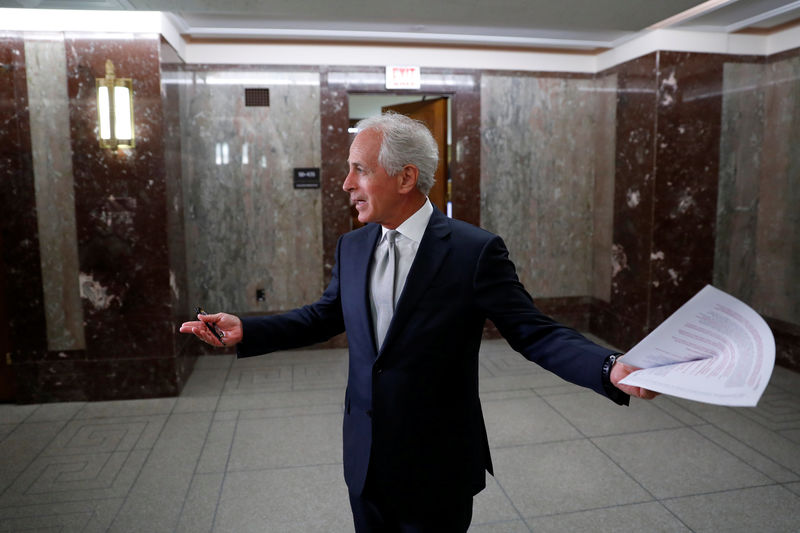By Patricia Zengerle
WASHINGTON (Reuters) - U.S. Senator Bob Corker, the influential Republican chairman of the Senate Foreign Relations Committee, said on Tuesday he will not run for re-election, a blow to a party already struggling to balance divisions between mainstream and more populist wings.
A former mayor of Chattanooga, Tennessee, and a businessman, Corker, 65, had said when he was elected that he could not imagine serving more than two Senate terms. He said early this month he had not decided whether he would seek a third next year.
An establishment Republican, Corker has been criticized from the right, and a conservative activist had already announced a primary challenge. But he was expected to keep the seat, and had amassed a $7.5 million campaign war chest.
Corker has ruled out running for governor of Tennessee.
"I have no idea what I'm going to do. No idea whatsoever," Corker said in an interview. But he said he was not leaving out of frustration over deep party divides that have often paralyzed Congress.
Corker announced his retirement on the day of the failure of the latest Republican effort to repeal former Democratic President Barack Obama's healthcare law.
"I am not going to be one of the people who leaves here badmouthing what is one of the greatest privileges of one's life," Corker said.
"I know I'll miss this place," he said.
He said he realized he was ready to retire on Aug. 24 during a factory groundbreaking in Clarksville, Tennessee, and almost announced his decision at least twice before Tuesday. Corker said that he made his announcement now to allow a strong candidate time to enter the Senate race.
Corker is the first senator to announce his retirement ahead of the 2018 mid-term elections, when one-third of the 100-seat chamber will be up for grabs. Tennessee is a solidly Republican state and the party, which currently holds a 52-seat majority in the Senate, is favored to keep his seat.
In his official announcement, Corker said that "after much thought, consideration and family discussion" over the past year, he and his wife Elizabeth "have decided that I will leave the United States Senate when my term expires at the end of 2018."
CLASHES WITH TRUMP
Corker has been a close national security adviser to President Donald Trump and was on the short list last year to be both his vice president and Secretary of State.
But he has also clashed with the White House.
In August, after Trump's much-criticized reaction to violence at a white supremacist rally in Virginia, Corker told reporters in his home state Tennessee that Trump had not been able to demonstrate the "stability" or competence that he needed to be successful as president.
Trump struck back on Twitter, where he said Corker's statements were "strange" considering that he is "constantly asking me whether or not he should run again in ’18."
"Tennessee not happy!" Trump tweeted.
After the exchange, the two men had an hour-long meeting at the White House this month that Corker has described as a wide-ranging and friendly discussion.
Corker will remain chairman of the Foreign Relations Committee until he leaves in January 2019. He said he wanted the panel to address issues including Secretary of State Rex Tillerson's State Department reorganization, food aid reform, and the fight against human trafficking and modern slavery.
Corker said the committee would address the international nuclear agreement with Iran, as Trump faces a mid-October deadline for deciding whether to certify that Tehran is complying with that pact. That decision could force Congress to decide whether to reimpose sanctions. Corker would not say whether Trump had decided to certify or not.
It was not immediately clear who would succeed him as foreign relations chairman if Republicans maintain their Senate majority. Jim Risch is the next Republican in line, but Marco Rubio, one of Trump's rivals last year for the presidential nomination, is also considered a contender.
Corker is known for working with Democrats on a range of issues, from foreign relations to immigration and Obama's auto industry bailout.

His statement alluded to his desire to continue to work "thoughtfully and independently" in the next 15 months, which could signal more conflicts with Trump.